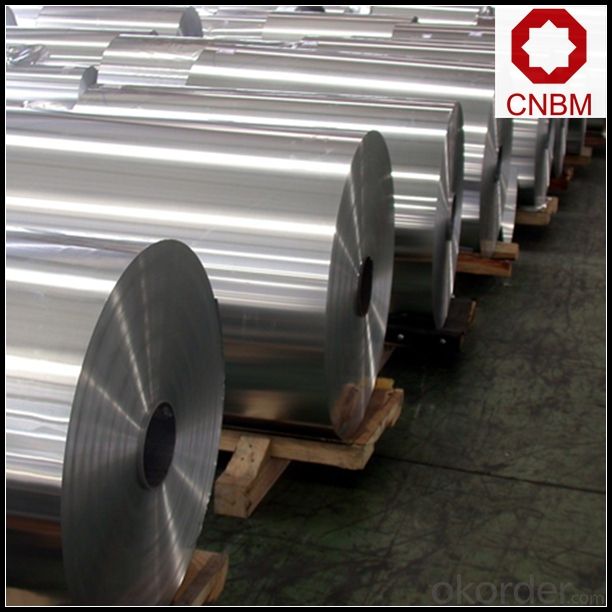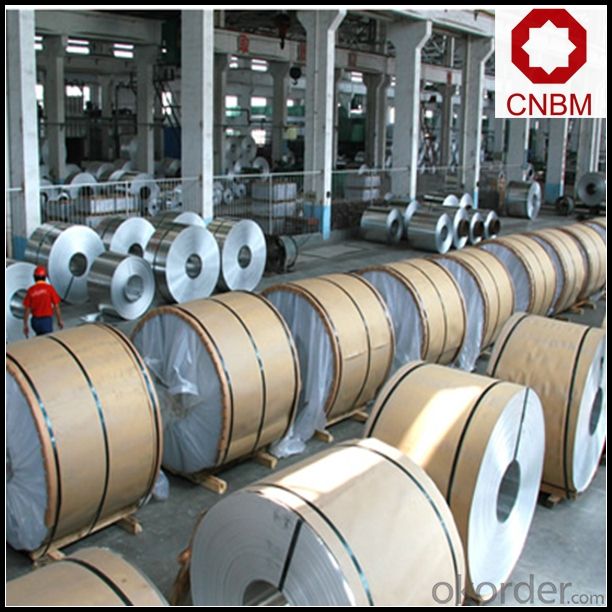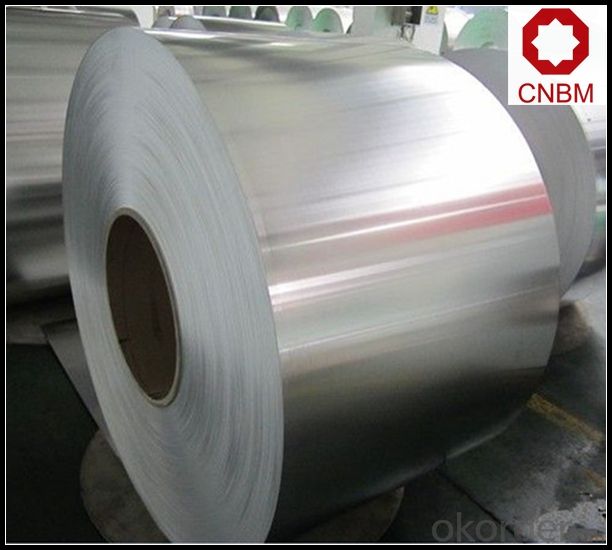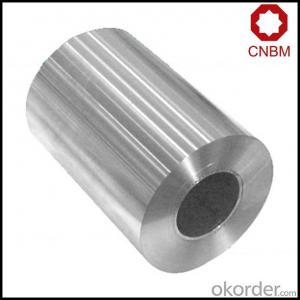Aluminium Coil/Aluminium Strip China Supplier with Good Price 1XXX 3XXX 5XXX
- Loading Port:
- Shanghai
- Payment Terms:
- TT OR LC
- Min Order Qty:
- 5 m.t.
- Supply Capability:
- 10000 m.t./month
OKorder Service Pledge
OKorder Financial Service
You Might Also Like
Item specifice
1. Specification of Aluminium Coil/Aluminium Strip China Supplier with Good Price 1XXX 3XXX 5XXX
1) Alloy | 1050, 1060,1100, 3003 3004 3105 3A21 5005 5052 etc |
2) Temper | O/H12/H14/H1/H18/H32/H34/H36/H38//H111/H112/H116/H321/T6/T651/T3/T351 etc |
3) Thickness | 0.1mm to 6mm |
4) Width | 20mm to 3300mm |
5) Coil weight | 100kgs to 6 tons depends on actual requirement |
6) Core material | Aluminum or paper |
7) Coil Inner diameter | 75mm, 150mm, 200mm, 300mm, 405mm, 505mm or as required |
8) Protective film can be added
2. Application of Aluminium Coil/Aluminium Strip China Supplier with Good Price 1XXX 3XXX 5XXX
(1).Interior: wall cladding, ceilings, bathrooms, kitchens and balconies, shutters, doors...
(2).Exterior: wall cladding, facades, roofing, canopies, tunnels,column covers , renovations...
(3).Advertisement: display platforms, signboards, fascia, shop fronts...
3. Feature of Aluminium Coil/Aluminium Strip China Supplier with Good Price 1XXX 3XXX 5XXX
*Such coil is specially designed to replace aluminum ingot, due to the high export tax of aluminum ingot, the coil has better price than ingot.
*This type of coil can fit customer's remelting furnace just like ingot, no need to make any change to the production line that was previously used for ingot. The standard coil size and weight is very suitable for the feed gate of furnace.
*This type of coil causes less material wastage than ingot when remelted.
*Our coil is made directly from ore, no need to go though the ingot making process, quality is much better than other suppliers who use ingot scrap to make coil.
Be free from Oil Stain, Dent, Inclusion, Scratches, Stain, Oxide Dicoloration, Breaks, Corrosion, Roll Marks, Dirt Streaks and other defect which will interfere with use
4. Certificate:
SGS and ROHS(if client request, paid by client), MTC(plant provided), Certificate of Origin(FORM A, FORM E, CO), Bureau Veritas and SGS (if client request, paid by client), CIQS certificate
5. Image of Aluminium Coil/Aluminium Strip China Supplier with Good Price 1XXX 3XXX 5XXX



6. Package and shipping of Aluminium Coil/Aluminium Strip China Supplier with Good Price 1XXX 3XXX 5XXX
eye to wall
eye to the wall
with wood pallet (wooded case also available)
7. FAQ
1) What is the delivery time?
Dpends on actual order, around 20 to 35 days
2)What is the QC system:
We have QC staff of 20 persons and advanced equipment, each production is with MTC traced from Aluminum ingot lot.
3) What market do you mainly sell to?
Australia, America, Asia, Middle East, Western Europe, Africa etc
- Q:Can aluminum coils be used in the construction industry?
- Yes, aluminum coils can be used in the construction industry. Aluminum is a versatile and lightweight material that offers several advantages for construction applications. Aluminum coils are commonly used in the construction industry for various purposes, such as roofing, siding, gutters, and fascia. One of the main benefits of using aluminum coils in construction is its corrosion resistance. Aluminum naturally forms a protective oxide layer on its surface, which prevents rust and corrosion. This makes it highly suitable for exterior applications, where exposure to moisture and weather elements is common. Additionally, aluminum coils are easy to shape and work with, making them ideal for creating custom components and structures. They can be easily cut, bent, and formed into different shapes, allowing for flexibility and creativity in construction projects. Another advantage of aluminum coils is their lightweight nature. Aluminum is significantly lighter than other metals like steel, making it easier to handle and transport. This can reduce construction costs and make installation processes more efficient. Furthermore, aluminum is a sustainable and environmentally-friendly material. It is 100% recyclable and can be reprocessed repeatedly without losing its properties. This makes aluminum coils an eco-friendly choice for construction projects. In conclusion, aluminum coils are widely used in the construction industry due to their corrosion resistance, flexibility, lightweight nature, and sustainability. They offer numerous advantages for various applications and contribute to the overall efficiency and durability of construction projects.
- Q:How do aluminum coils contribute to energy-efficient insulation?
- The role of aluminum coils in enhancing energy-efficient insulation cannot be overstated. To begin with, aluminum is an exceptional heat conductor, allowing it to effectively transfer heat away from its source and minimize heat penetration into insulated spaces. This quality ensures a stable and comfortable indoor environment, thereby reducing the need for excessive heating or cooling. Moreover, aluminum coils find extensive application in air conditioning and refrigeration systems, where they serve as the primary heat transfer medium. By efficiently absorbing and dissipating heat, these coils expedite the cooling process, resulting in reduced energy consumption and improved overall energy efficiency. Furthermore, the lightweight nature of aluminum makes it highly convenient for handling and installation in insulation systems. Its low weight provides flexibility and ease during manufacturing and transportation, leading to cost and energy savings. In addition, aluminum coils possess remarkable corrosion resistance, guaranteeing their durability and preventing the deterioration of insulation performance over time. This longevity ensures long-term energy efficiency as the insulation system remains effective without the need for frequent maintenance or replacement. In conclusion, aluminum coils significantly contribute to energy-efficient insulation through their effective heat conduction, facilitation of rapid cooling in air conditioning systems, reduced energy consumption, lightweight and easy handling, as well as long-lasting performance due to corrosion resistance. These qualities make aluminum coils the ideal choice for enhancing energy efficiency in insulation applications.
- Q:Are aluminum coils suitable for coil coating applications?
- Yes, aluminum coils are suitable for coil coating applications. Aluminum is highly corrosion-resistant, lightweight, and flexible, making it an ideal material for coil coating processes. Additionally, aluminum offers excellent durability, weather resistance, and color retention, making it a popular choice for various industries such as construction, automotive, and appliances.
- Q:What are the different coil coating options available for aluminum coils?
- There are several coil coating options available for aluminum coils, including polyester, polyurethane, acrylic, PVDF (Polyvinylidene Fluoride), and epoxy coatings. These coatings provide various levels of durability, corrosion resistance, color retention, and flexibility, making them suitable for different applications and environments.
- Q:What are the different yield strengths of aluminum coils?
- The grade or alloy of aluminum used can cause variability in the yield strength of aluminum coils. Aluminum is available in various grades, including 1100, 3003, 5052, and 6061, among others. Each grade possesses its own unique properties, which include differing yield strengths. For example, the 1100 grade of aluminum exhibits a relatively low yield strength of approximately 12,000 psi. This particular grade is typically utilized in general-purpose applications where high strength is not a primary requirement. Conversely, the 6061 grade of aluminum demonstrates a considerably higher yield strength of around 35,000 psi. This grade is commonly employed in structural applications or scenarios that demand greater strength and durability. It is important to acknowledge that the yield strength of aluminum coils can also be influenced by factors such as material thickness and temper. Generally, thicker coils possess higher yield strengths, while various tempering processes can further enhance the strength and other mechanical properties of the aluminum. To summarize, the yield strength of aluminum coils can vary due to the grade, thickness, and temper of the material. When selecting the appropriate aluminum coil for specific applications, it is crucial to consider these factors to ensure optimal performance and structural integrity.
- Q:What is the weight of aluminum coils per square foot?
- The weight of aluminum coils per square foot can vary depending on the thickness of the coil. On average, aluminum coils weigh around 0.5 pounds per square foot. However, it is important to note that this is an approximate figure and may vary slightly depending on the specific alloy and manufacturing process used. It is always recommended to consult the manufacturer or supplier for the exact weight specifications of the aluminum coils you are working with.
- Q:What are the different grades of aluminum used in coils?
- There are several different grades of aluminum commonly used in coils, including 1100, 3003, 5052, and 6061. Each grade has its own unique characteristics and properties, making them suitable for different applications. For example, 1100 aluminum is known for its excellent corrosion resistance and high thermal conductivity, making it ideal for heat exchangers and fins. On the other hand, 5052 aluminum offers good formability and moderate strength, making it commonly used in automotive and marine applications. Lastly, 6061 aluminum is a versatile grade with excellent strength-to-weight ratio, making it suitable for structural components and aerospace applications.
- Q:Are aluminum coils suitable for electrical transformer applications?
- Yes, aluminum coils are appropriate for use in electrical transformer applications. Aluminum coils possess several advantages over traditional copper coils when utilized in transformers. To begin with, aluminum is a lightweight metal, making it easier to handle and transport. This is particularly advantageous for large transformers where reducing weight is desired. The lightweight nature of aluminum coils also facilitates easier installation and maintenance. Secondly, aluminum exhibits excellent electrical conductivity, albeit not as conductive as copper. However, aluminum coils can compensate for lower conductivity by employing larger wire sizes or increasing the number of turns. This ensures that the transformer operates efficiently and effectively. Moreover, aluminum has a higher thermal conductivity compared to copper. Consequently, aluminum coils can dissipate heat more efficiently, which is crucial for the proper functioning and longevity of transformers. This increased heat dissipation aids in reducing the transformer's operating temperature, thereby enhancing its overall performance. Furthermore, aluminum serves as a cost-effective alternative to copper. Generally, aluminum is less expensive than copper, making it a more economical option for transformer manufacturers. This cost advantage can be particularly significant in large-scale transformer production. However, it is important to note that there are certain considerations to be mindful of when utilizing aluminum coils in transformer applications. Aluminum coils are more susceptible to oxidation and necessitate proper insulation to prevent corrosion. Additionally, aluminum coils may exhibit slightly higher electrical losses compared to copper coils, although advancements in design and manufacturing techniques have mitigated this concern. In conclusion, aluminum coils are indeed suitable for use in electrical transformer applications. They offer benefits such as lightweight construction, excellent electrical conductivity, superior thermal conductivity, and cost-effectiveness. However, it is crucial to implement proper insulation and preventive measures to address any potential challenges associated with aluminum coils, ensuring optimal performance and durability of the transformers.
- Q:What are the different surface protection options available for aluminum coils?
- Some of the different surface protection options available for aluminum coils include anodizing, painting, powder coating, and laminating. Anodizing creates a durable and corrosion-resistant oxide layer on the surface of the aluminum. Painting involves applying a protective layer of paint to the surface, which can provide both aesthetic appeal and protection against corrosion. Powder coating involves electrostatically applying a dry powder to the surface, which is then cured to create a durable and protective coating. Laminating involves bonding a protective film to the surface of the aluminum, which can provide resistance against scratching, UV rays, and chemicals.
- Q:Can aluminum coils be used in solar panel systems?
- Solar panel systems can indeed utilize aluminum coils. Aluminum is commonly selected as the material for frames and supports in solar panels because of its favorable combination of lightness and strength. Its resistance to corrosion, durability, and impressive thermal conductivity make it an ideal choice for enduring severe weather conditions and efficiently dispersing heat generated by the panels. Furthermore, aluminum is highly recyclable, which aligns perfectly with the environmentally conscious nature of solar energy systems. In conclusion, incorporating aluminum coils into solar panel systems enhances their efficiency, lifespan, and eco-friendliness.
1. Manufacturer Overview |
|
|---|---|
| Location | |
| Year Established | |
| Annual Output Value | |
| Main Markets | |
| Company Certifications | |
2. Manufacturer Certificates |
|
|---|---|
| a) Certification Name | |
| Range | |
| Reference | |
| Validity Period | |
3. Manufacturer Capability |
|
|---|---|
| a)Trade Capacity | |
| Nearest Port | |
| Export Percentage | |
| No.of Employees in Trade Department | |
| Language Spoken: | |
| b)Factory Information | |
| Factory Size: | |
| No. of Production Lines | |
| Contract Manufacturing | |
| Product Price Range | |
Send your message to us
Aluminium Coil/Aluminium Strip China Supplier with Good Price 1XXX 3XXX 5XXX
- Loading Port:
- Shanghai
- Payment Terms:
- TT OR LC
- Min Order Qty:
- 5 m.t.
- Supply Capability:
- 10000 m.t./month
OKorder Service Pledge
OKorder Financial Service
Similar products
New products
Hot products
Related keywords





























